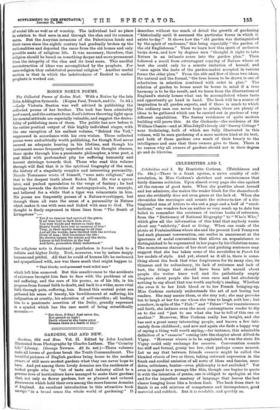RODEN NOEL'S POEMS.
The Collected Poems of Roden Noel. With a Notice by the late John Addington Symonds. (Kegan Paul, Trench, and Co. '7s. fid.) —Lady Victoria Buxton was well advised in publishing the collected poems of her brother. The task has been admirably performed, and the extracts from Noel's letters throwing light upon his mental attitude are especially valuable, and suggest the desira- bility of publishing more of them. The public has now before it the entire poetical output of this highly individual singer, with the one exception of his earliest volume, "Behind the Veil," suppressed in accordance with his own wishes. These collected poems were undoubtedly worth publishing, for though Noel never secured an adequate hearing in his lifetime, and though his instrument seems frequently imperfect and his thought obscure, there spoke through him a passionate philosopher, a true poet, a soul filled with profoundest pity for suffering humanity and fervent strivings towards God. Those who read this volume through will find that it is the spiritual biography of the man, the history of a singularly complex and interesting personality. Niccolo Tommaseo wrote of himself, " sono nato religioso," and that is the deepest truth about Roden Noel. He was a specu- lator, and pushed speculation to the verge of fantasy ; he had leanings towards the doctrine of metempsychosis, for example, and believed for a while that a tiger was reincarnate in him. His poems are frequently paeans of a Nature-worshipper, but through them all rams the sense of a personality in Nature which makes it one with man and linked with man to God. The thought is finely expressed in these lines from "The Death of Livingstone" :—
"Yet if no rumour had survived the grave,
If all were lost in dark Ilala-wave, You very woods and waters in their dim Hearts would have lost no memory of him I They, in their mystic message to all time And all the worlds, have thrilled with the sublime Story of man ; God reassumes the life ; He crowns unseen the labour and the strife.
Labour is full fruition in the bud And faith, possession dimly understood."
The religions note is dominant ; pantheism is forced back to a definite and higher Deity. Noel, moreover, was by nature deeply humane and pitiful. All that he could of human life he embraced and sympathised with, nor was there much that might happen to
"That bloody, soul-possessed weed called man"
which left him unmoved. But this sensitiveness to the accidents of existence brought him face to face with the problems of sin and suffering, and the core of his poems, as of his life, is his progress from formal faith to doubt, and back to a wider, more vital faith through pain, suffering, loss. Round this central point are gathered his sense of beauty, his bewilderment at suffering, his indignation at cruelty, his adoration of self-sacrifice; all leading him to a passionate assertion of the Deity, grandly expressed in a symbol which has the rare merit of being scientifically accurate :—
" But thou, 0 Sun! dost never die, Nor ascend on high
Earth whene'er she turns away Dreams there is a death of Day."






















































 Previous page
Previous page